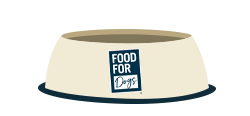
The condition of your dog’s skin and coat are good indicators of their overall health. Because a dog’s coat grows from hair follicles in the skin the two need to be considered together – to have a shiny coat, your dog also needs to have healthy skin.
The skin is the largest organ in your dog’s body and serves many important functions:
- Environmental barrier
- Regulates temperature
- Plays a role in the immune system
- Provides mechanical support to the body
Unhealthy skin therefore cannot only be a symptom of an underlying problem with your dog but also cause further health issues.
Healthy skin is one that is supple and clear, not greasy, flaky, or bumpy and is free of blemishes, breaks and sores. A healthy coat is one that is shiny, firm, and complete. and free of coarse fur, loose fur and skin flakes.
Nutrition plays an important role in building and maintaining a healthy skin and coat. Dogs require a diet that is complete and balanced and based on high quality ingredients. When choosing a dog food look out for the following.
- High level of protein. Your dog’s fur is made up mostly of protein, so ensuring that your dog is receiving adequate levels of dietary protein, particularly meat protein, is vital to having a healthy coat.
- Omega 3 and omega 6 essential fatty acids. Many skin and coat issues arise from deficiencies in essential omega fatty acids. Ingredients that provide these include marine sources, like fish, fish oil and algae sources.
- The mineral Zinc is needed for skin integrity. This should be provided as part of a supplementary and dog-specific vitamin and mineral mix.
- Vitamin A and E. Vitamin A is essential for normal cell maintenance and keratin formation. Vitamin E is a natural antioxidant that helps to protect against free radical damage to the skin. These three vitamins should be provided as part of a dog-specific vitamin and mineral mix.
Food for Dogs contains all of the above ingredients and at the levels required to be beneficial to your dog.
In addition to diet, regular coat care is important.
- Brushing: regular brushing of your dog’s coat removes dirt and dust, loose fur and help with moulting. Long haired dogs usually require brushing each day and it is especially important to remove dead hair and detangle their coats.
- Grooming: depending on your dog’s coat type, it is important that you use grooming products and shampoos that are suitable to their coat type.
- Skin checks: it is important to check your dog’s overall skin health, looking for any signs of dryness, red marks, excessive scaling and parasites.
If your dog is having ongoing issues with their coat and skin despite regular grooming, providing a complete and balanced diet and have no underlying health issues, please contact your veterinarian.


